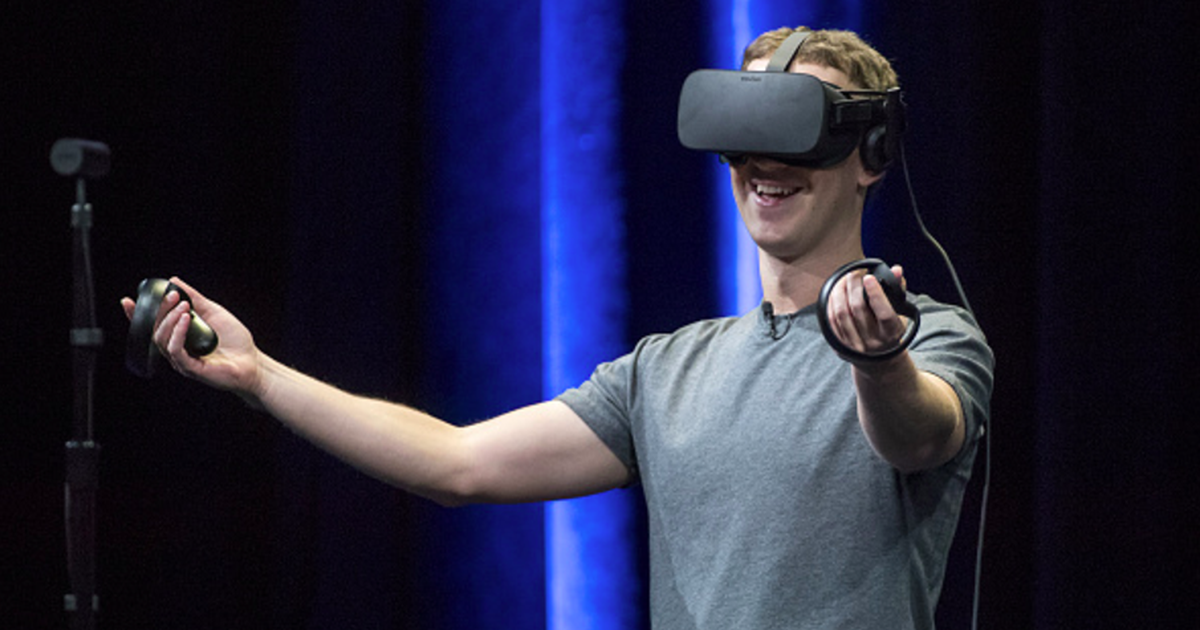You know Mark Zuckerberg’s serious when he puts on a suit

/https%3A%2F%2Fblueprint-api-production.s3.amazonaws.com%2Fuploads%2Fcard%2Fimage%2F351097%2Fa719302d-4da4-49e2-99ae-d3c1acba7a35.png)
Tuesday was a serious day in the life of Mark Zuckerberg.
So serious, he wore a suit.
The CEO of Facebook ditched his usual ensemble of a gray t-shirt and jeans for a suit jacket and tie Tuesday to testify in court that his virtual reality company, Oculus, wasn’t stolen technology. The trial, which began last week, is taking place in a Dallas federal court.
Mark #Zuckerberg abandons hoodie for Dallas court appearance in @oculus_rift trial, ICYMI. @dallasnews pic.twitter.com/YfHJMkUbkc
Arnessa Garrett (@agarre) January 17, 2017
The accusations directed at Facebook come from ZeniMax Media, the video game creator behind popular titles like Doom, Quake and Fallout, and center around one man: John Carmack.
Oculus had hired Carmack from ZeniMax to serve as its chief technology officer back in August 2013. A few short months after Facebook acquired Oculus in March 2014, ZeniMax filed a lawsuit accusing Oculus via Carmack of stealing intellectual property.
Why Zuck?
Carmack, in his testimony last week, denied directly using his work at ZeniMax to build Oculus, which currently sells a virtual reality headset for $599 and is planning much more.
On Tuesday, Zuckerberg, who was the one who orchestrated the deal in 2014, took the stand to reiterate and broaden those claims. It was Zuckerberg’s first time testifying, he admitted, but the young CEO is not unfamiliar with lawsuits. He was sued by former Harvard classmates, again for stealing intellectual property, to create Facebook. The lawsuit was settled privately.
Im here because I believe [the claims are] false, and its important to testify to that,” Zuckerberg said. The idea that Oculus products are based on someone elses technology is just wrong.
“Like most people in the court, Ive never even heard of ZeniMax before.”
Zuckerberg also filled his testimony with zingers that framed Facebook as powerful and ambitious, as tweeted and written by The New York Times and Gizmodo reporters who were inside the Dallas courtroom.
“Like most people in the court, Ive never even heard of ZeniMax before.”
It is pretty common when you announce a big deal or do something that all kinds of people just kind of come out of the woodwork and claim that they just own some portion of the deal,” Zuckerberg said, according to the Times.
“I know that our legal team would look into this and examine this, but they aren’t going to take a lot of my time on something they don’t think is credible,” he continued.
New motto
ZeniMax tried to position Zuckerberg’s investing strategy as hasty, and therefore leaving potential to miss the impending conflict between the video game maker and the virtual reality startup.
When Carmack was at ZeniMax, the company was working with Oculus. But then Facebook would go on to recruit Carmack and buy Oculus. Zenimax claims that during the acquisition a non-disclosure agreement it had with Oculus founder Palmer Luckey was violated. Zuckerberg denied knowledge of the agreement, Gizmodo reported.
The deal between Facebook and Oculus did move quickly. Amin Zoufounoun, the vice president of corporate development at Facebook, conducted a legal review over a single weekend, according to Zenimax’s lawyer, Tony Sammi.
Sammi asked Zuckerberg about Facebook’s motto of “move fast, break things.” Zuckerberg revealed that his company had retired that motto.
“Our new motto is build fast by building stable infrastructure. It doesnt have quite the same ring to it,” Zuckerberg said, according to the Times.
Zuckerberg first unveiled that motto during the keynote presentation at the F8 Developers conference in 2014.

Facebook CEO Mark Zuckerberg presented at Facebook F8 conference in 2014.
Image: mashable
Beyond the new phrase, Zuckerberg said his team does think thorough acquisitions and at times has to move quickly due to competitive offers.
Being able to move quickly not only increases our chance of getting the deal done, but it keeps us from having to pay a lot more as the deal process drives out, Zuckerberg said, according to the Times.
For Oculus, Zuckerberg settled on $2 billion for the company and an additional $700 million in employee retention and $300 million in earn-out, totaling $3 billion.
Zuckerberg’s virtual reality quest
The court case is just another hurdle in Zuckerberg’s quest to own virtual reality. It’s a long and expensive journey for one of the wealthiest companies in the world.
this=something I’ve heard from multiple people close to Zuckerberg. Facebook missed out on owning the phone. VR is the next platform to win.
_ (@MikeIsaac) January 17, 2017
Oculus already has faced some internal disputes. Founder Palmer Luckey has been absent from the public since a report from The Daily Beast revealed he funded a “meme machine” against former presidential candidate Hillary Clinton during her campaign.
Luckey and former Oculus CEO Brendan Iribe, who stepped down in December, are due to testify later this week.
Zuckerberg accomplished something else while in Texas, having completed the first stop of his tour to visit and meet people in every state in America in 2017. He positioned it as his annual resolution, but Silicon Valley also has suspected it to be a check on his to-do list for a future campaign to be U.S. president.
BONUS: We built a VR-ready computer for less than $800 (and you can too)
Read more: http://mashable.com/2017/01/17/mark-zuckerberg-oculus-trial/